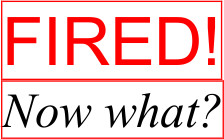 If you’ve recently been fired or have lost your job through any other means, what do you say about it on your resume?
If you’ve recently been fired or have lost your job through any other means, what do you say about it on your resume?
The short answer is nothing.
Your resume is not the place to mention a firing, layoff, or any other circumstance that could remotely be interpreted as negative. I don’t recommend including it in your cover letter, either.
The rule for social media is the same as for your resume. Do not broadcast the facts or your feelings about being fired anywhere on social media. Stay in control of this information. If you need to talk about it, choose a trusted friend, relative, pastor, or therapist. Your professional future depends on it.
On Applications
You may have to include reasons for leaving on a job application, however, so we’re going to cover some of the ways you can talk about it there. Saying you were fired is shorthand. You don’t get a paragraph’s worth of space on most applications to explain, so it’s tempting to use the term fired.
Don’t do it. It may be short, but it’s also the most negative way you can express that circumstance. It’s usually a lot more complicated than that. I don’t recommend going into a whole big explanation about what happened and who said what and why. That’s as bad as saying you were fired. It shows you aren’t over it.
Change your own attitude
The first thing that needs to happen is to examine the way you look at being fired.
- Who are you blaming?
- What are you still angry about?
- What still hurts?
Talk with a trusted friend or write about these issues. Concentrate on taking the sting out of them. You will continue to have trouble with a job search if your heart and mind are still focusing on what happened at your last job. One way to look at your firing is like a no-fault divorce. You’re not blaming yourself or the company. You’re not blaming anyone at all. You’re just parting ways.
What to say
When you’re ready for a job search and need to give a reason for leaving a job, keep your explanation short, sweet, and to the point. You could say something like:
- Our goals became different.
- The company and I moved in different directions.
- My manager and I decided another opportunity was best for me.
- When the merger occurred, the company culture became one that didn’t fit me.
- With the new leadership, I discovered my goals and the company’s were no longer aligned.
Interviewing
Sometimes, your reason for leaving a job will come up in the interview, as well. The responses above are appropriate for this use. Think about your own circumstance and make your answer your own. Practice your response until it feels natural and comfortable.
The biggest danger is that you will say too much in the interview, trying to blame your former employer or justify yourself. Neither is appropriate no matter how wronged you feel.You can talk about that with your friends and family, but not with your next boss.
If you find it impossible to interview without talking about your former employer, you may find it helpful to talk with a psychotherapist about your situation. Once you have desensitized yourself about the job loss, you can make progress in landing a new one.
If you have experienced a recent job loss and are finding it difficult to move forward, contact me today to set a time to talk about what we might do to help you move forward.
Special Note Get Jason Alba’s videos free for 30 days (any time you sign up)
If you know about Jason Alba, you know what an opportunity this is. If you haven’t yet heard of Jason or his job search site JibberJobber.com, then you’re in for a treat.
Related








